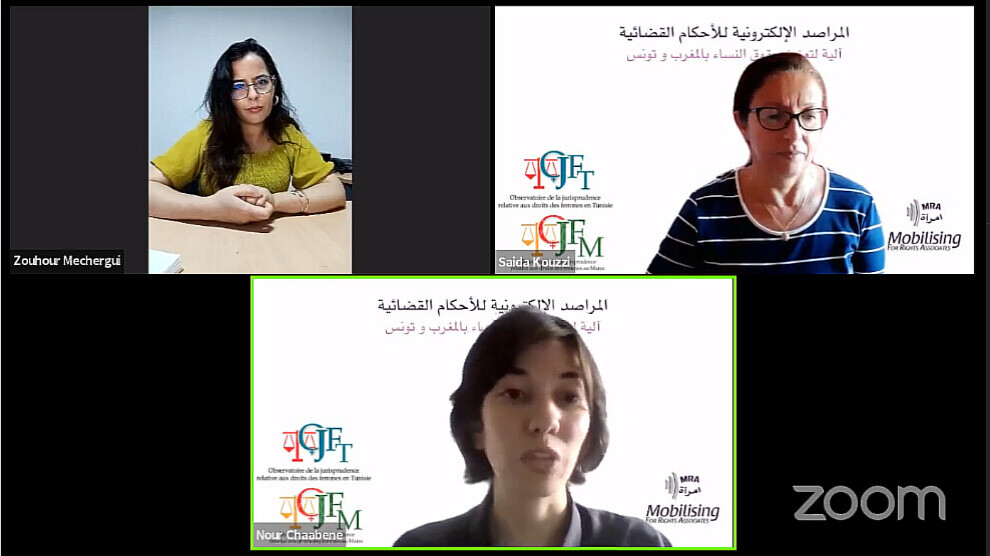Webinar on judicial decisions to promote women’s rights in Tunisia and Morocco
A webinar on judicial decisions was held on November 7 to promote women’s rights in Tunisia and Morocco. The panelists discussed two observatories which is a tool for promoting women’s rights.

Tunisia- On November 7, a webinar titled, “Online court decision Observatories: A tool for promoting women’s rights in Morocco and Tunisia” by the Mobilising For Rights Associates (MRA), an international non-profit organization based in Morocco. NuJINHA reporter Zuhur Mechergui attended the webinar coordinated by Nour Chaabene. At the webinar, the panelists highlighted the necessity of the effective implementation of existing laws combating violence against women in both countries and the roles of observatories
Court decisions from diversity of jurisdictions
Stephanie Willman Bordat, a founding partner at MRA Mobilising for Rights Associates, began to speak by giving information on two web pages of online observatories, one for Tunisia and one for Morocco. Drawing attention to online databases of court decisions from diversity of jurisdictions in both Tunisia and Morocco, she said, “When we say diversity of jurisdictions, we talk about a jurisdiction's diversity, thematically. The decisions from administrative courts, from family courts, from commercial courts, from regular first instance courts etc. We talk about the diversity of the form at a geographic level. The court cases of observatories are not just the court cases from the large capital cities but from a diversity of the smaller cities and towns across both countries,” she said.
Talking about family codes in both countries, she said, “The current personal status and family codes in both countries or the recent 2017 and 2018 laws on violence against women in both countries have got legal gaps. They have many different provisions that are discriminatory against women and are frequently not implemented. They are not in harmony either with the new national constitutional standards or with the international human rights standards. Those were some of the obstacles and challenges that led us to create the opportunity.” She also highlighted the important role of the observatories for promoting women’s rights in both countries.
Mounira Balghouthi, a Tunisian activist and the coordinator of the observatory project in Tunisia, talked about the reasons behind creating online observatories in both countries. “This is an initiative aimed to create an observatory database that would allow legal practitioners and lawyers to keep up to date on the decisions issued by Tunisian courts and to be a practical tool for lawyers. It was designed to highlight how court decisions prevent women from fully enjoying their human rights. As an initiative, we want to encourage access to information for all legal practitioners, professionals, and lawyers. The initiative is a database giving information about laws and court decisions in Tunisia to those interested in gender justice and legal rights of women. There is no system collecting and publishing court decisions in Tunisia and Morocco. On the webpage, we provide information about court decisions. We launched such an initiative because local activists and researchers highlighted that they had difficulties in reaching court decisions because they could not have access to archives of the courts.”
